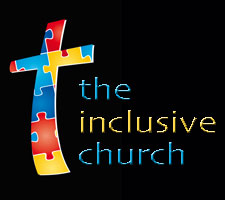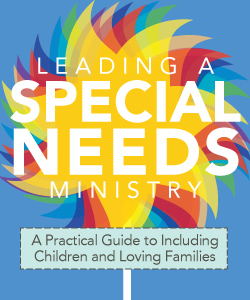When a Child Shows Signs of Autism – Part 2
It is not uncommon to have a child participating in the typical the children’s ministry environment that exhibits behaviors associated with autism. Oftentimes the child’s parents have not alerted the kidmin team of any diagnosed or suspected learning difference. Inevitably, the child’s teachers and ministry leaders deliberate whether or not they should share their observations with the child’s family. Every situation is different and requires earnest prayer for discernment. There is no perfect answer for how to handle any individual child, family or church. However the children’s ministry team may want to consider the following factors and ideas when determining what to say (or not say) to the child’s parents regarding a suspected autism diagnosis.
See yesterday’s post, When a Child Shows Signs of Autism – Part 1, Question #1 for more background on why churches seek guidance on this issue.
Do the parents seem receptive to honest feedback on their child? If a parent openly expresses concern about their child’s mannerisms, inviting dialogue from their child’s teachers, then the door may be open for honest yet delicate dialogue. Nearly always an established and positive relationship is required before a parent can receive feedback from a church representative. In cases where it is sensed that the parents are dismissive of their child’s nuances, it is safe to assume the family is not ready to address the issues. There are a variety of reasons a family may not want to pursue testing or reveal an already diagnosed difference. Regardless, it is rarely if ever productive for the church to “push” the idea of a potential disability with the parents.
Dr. Cynthia Zierhut, Clinical Psychologist specializing in the area of autism research and Founding Director of Capital Christian Center’s Champions Ministry (Sacramento, CA) explains,
“When I led the Champions Special Needs Ministry it was not uncommon for me to be pulled into a typical children’s ministry environment on a Sunday to discreetly observe a particular student. Indeed I may have seen signs of a problem that warranted a diagnostic evaluation. But even with my credentials, I would never approach a parent to suggest the need for testing or treatment. My purpose for observing the child in the church setting was to provide quiet guidance to the children’s ministry team. Oftentimes I could offer a strategy that would ultimately help the student or the volunteers.”
Zierhut reminds children’s ministry leaders that the role of the church is to aid in the spiritual formation of the family. Anytime a representative of the church expresses an opinion about a child’s educational development (or lack thereof), there is a risk of offending the parents and consequently losing influence. For two previous posts on a related topic see:
Avoid Controversial Topics & Remain Focused on the Mission
Should We be Discussing the Autism Vaccine Controversy?
Occasionally a children’s ministry caregiver or leader may approach the parent with a single observation. Barbara Newman, CLC Network Director of Church Services Division and book author, suggests beginning a brief and light-hearted parent conversation by first noticing some delightful things about the child. After sharing some affirming observations, the children’s ministry leader may inquire about the one biggest issue by asking a parent the question “Have you noticed…?” Newman warns children’s ministry teams not to approach a family with too much information. Parents nearly always need some time to process the feedback. In the meantime, the parents may have useful information to offer the teachers once the question has been asked. Newman points out that if a child has demonstrated a certain behavior more than once in the church setting, it is likely the family is familiar with the behavior. Parents may be able to explain the impetus behind the actions and offer advisement to help teachers respond in the most beneficial manner to the child.
For a church’s weekday preschool, the guidance may differ slightly from the above. Because part of the mission of a weekday preschool is to help a child prepare for kindergarten, the stage is already set to have discussions about the student’s educational and social development. Several years ago I made the decision to pursue a professional evaluation for my child because of what his preschool teacher shared in our parent-teacher conference. It was a logical part of the scheduled conversation to talk about my child’s academic strengths and challenges, and how immediately addressing a potential learning disability could help him in the long run. In the case of a church’s weekday preschool and their parent-teacher conversations, Barbara Newman’s advisement (above) still applies…it is ideal to point to the child’s strengths first, to begin the conversation with the question, “Have you noticed…?” and to allow parents to process one issue or concern at a time.
Stay tuned for Part 3, when we address instances where challenging behavior has emerged in the church setting.
– Amy Fenton Lee
Like this post or any of its content? See Rules for Repost.



This is a tough situation to be in. I am aware of families at my previous church that absolutely did not want any labels for their children, not even to have an extra buddy in the class when the child was disruptive.
At my new church, they are very intentional and outspoken about their determination to include all people at all levels within the church community, and I think this clear message helps people be more open about their struggles. For some churches, the message of acceptance and support may need to be heard from the leadership clearly before families will risk opening up. Of course, an individual may be resistant for many reasons no matter how welcoming a church is.
If it’s a daycare/preschool situation, you absolutely have the responsibility to communicate your concerns and help the parent get connected with the appropriate agency for a screening or evaluation. I’m not sure if private institutions are legally obligated to be involved with Child Find, but they are definitely morally obligated, in my opinion.
Trish – I really appreciate your comment! I also agree that families need to hear the message of acceptance and support repeatedly and from leadership within the church. Fantastic point! I also agree that preschools of any affiliation (private or public) are obligated to direct families in the path of the free testing and assistance that may help a child in a big way. Thank you!
We are facing a similar issue right now with a child in kindergarten. And also facing the issue of which ministry leader should approach the parent. I’m interested in your thoughts!